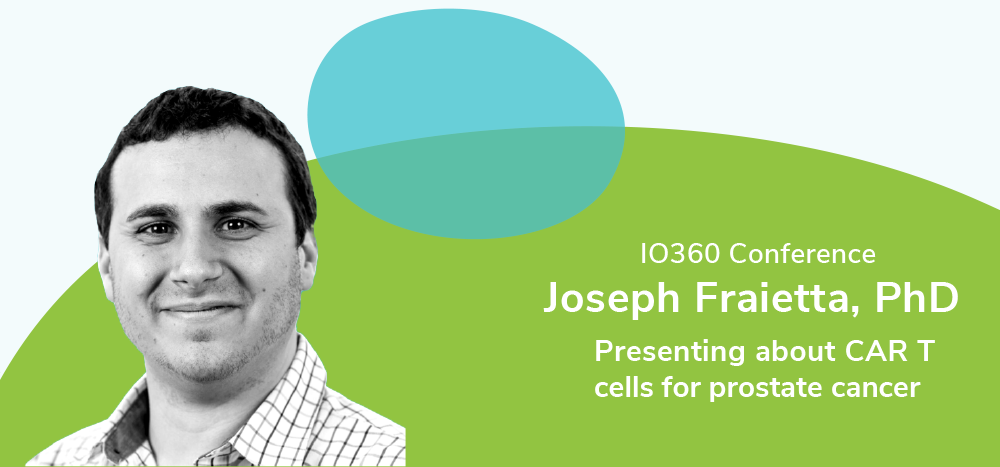
Joseph Fraietta, PhD, is one of the many scientists looking for a way to leverage the power of CAR T cells against prostate cancer and other difficult-to-treat solid tumors.
Later this month, Dr. Fraietta will present an update on progress he and others have made, with support from an Alliance for Cancer Gene Therapy grant, issued in 2019.
The University of Pennsylvania researcher is one of the scheduled speakers at the upcoming Immuno-Oncology 360 conference in New York City. For those interested in attending, his presentation “Lessons Learned from CART-PSMA-TGFβRDN and Next Steps” will be at 2:05 p.m. on Thursday, March 17.
Dr. Fraietta isn’t the only person with ties to Alliance for Cancer Gene Therapy speaking at the conference. Scientific Advisory Council member Christine Brown, PhD, Deputy Director of the City of Hope T Cell Therapeutics Research Laboratory, is a keynote speaker. She will give a presentation at 1:45 p.m. Thursday, March 17 on the advancements of using CAR T cells for glioblastoma.
If you’d like to register to attend, please visit the Immuno-Oncology 360 page on the Conference Forum website.
Making potent CAR T cells to fight prostate cancer
CAR T cells are a type of cancer cell and gene therapy. CAR stands for chimeric antigen receptor, which is RNA (ribonucleic acid) added to T cells that are first removed and then returned to a patient’s body. The RNA engineers the T cells to seek specific antigens, or biomarkers, expressed by a tumor’s cells. This process provides the immune system with a stronger T cell to fight cancer.
Engineered T cells, such as CAR T cells, account for extraordinary disease-response rates for blood cancers like leukemia, lymphoma and myeloma. Solid tumors account for much more of the cancer patient population, and they’re tougher to treat with CAR T-cell therapies.
Dr. Fraietta wanted to discover why, particularly for prostate cancer.
He says a barrier to CAR T cells succeeding in solid tumors is the biological microenvironment, which he describes as a “nutrient desert.” This lack of nutrients deprives CAR T cells of what they need to function properly and persist against cancer cells, suppressing their ability to harness the immune system against the cancer.
Targeting glucose to strengthen CAR T cells for solid tumors
One of the necessary nutrients for CAR T cells to expand and proliferate is glucose, and Dr. Fraietta is researching the link between glucose availability in prostate cancer tumors and decreased potency of CAR T cells. Tumors often hoard nutrients in the microenvironment to grow quickly. This hoarding of energy sources also deprives healthy cells of what they need to fight the tumors.
If doctors can understand the science behind how tumors keep nutrients like glucose for themselves – and why engineered T cells don’t receive enough of this nutrient – then they can program a genetic fix to not only weaken tumors but to also strengthen CAR T cells.
This thought process is the source of Dr. Fraietta’s research and the Alliance’s grant funding. Dr. Fraietta will present on lessons he and his team learned in their study of metabolism and how tumors affect the share of nutrients – and ways to combat the phenomenon.
Dr. Fraietta wrote in his initial grant application that he intended to “provide a tumor-attack roadmap” for solid tumors in general. At the progress report point of his research, he has accomplished this goal.
“Our findings pave the way for CAR T cell therapy prostate cancer clinical trials, including ongoing and future studies to increase efficacy, predict outcome and refine the therapeutic window to eradicate solid tumors.” — Joseph Fraietta, PhD
How you can support Dr. Fraietta and other researchers’ work
In addition to being an Alliance for Cancer Gene Therapy Fellow, Dr. Fraietta is an Assistant Professor of Microbiology at the University of Pennsylvania Perelman School of Medicine.
Dr. Fraietta’s experience includes a postdoctoral fellowship under Carl June, MD, who created the first CAR T-cell therapy approved by the U.S. Food and Drug Administration. Dr. Fraietta was part of this scientific breakthrough for blood cancers and now aims to make CAR T cells effective against solid tumor cancers.
Please consider donating today to help Alliance for Cancer Gene Therapy create a cancer-free future. If you’re not ready to donate yet, please look at some of the other cancer research programs the Alliance has funded over the past two decades.
This background hopefully helps you understand Alliance for Cancer Gene Therapy’s purpose, including the steps taken to give more cancer patients hope of longer survival. 100% of all private donations to Alliance for Cancer Gene Therapy go directly to research and programs.



